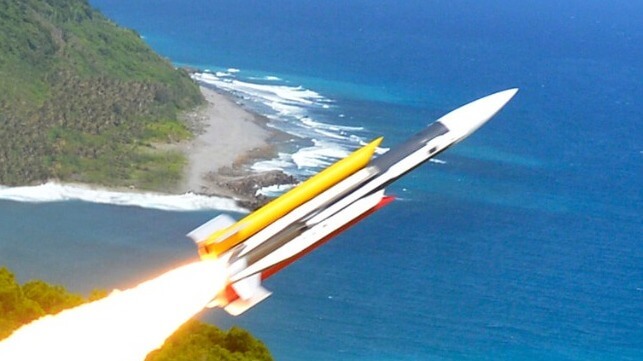Taiwan's Antiship Missile Program Sends Instrument to China By Mistake

Taiwan's missile development institute has come in for criticism after it sent a measurement device used for antiship missile production out for repairs - and it ended up in mainland China.
Taiwan's National Chung-Shan Institute of Science and Technology (NCSIST) designs and builds the nation's antiship missiles, including the heavyweight Hsiung-Feng III (Brave Wind III). This supersonic missile is land- and naval-target capable, and it delivers a 500-pound armor-piercing warhead out to a range of 250 miles - an adequate distance for covering the width and length of the Taiwan Strait. The missile is a key element of Taiwan's plans for defending against a Chinese invasion, and the institute is building 70 units a year to equip mobile launchers Taiwan's naval vessels.
On its production line for the Hsiung-Feng III, the NCSIST uses a precision theodolite to take measurements of the missile, the launcher and other elements related to missile setup and testing. The device of choice is built by a Swiss manufacturer and is commonly employed in aerospace, shipbuilding and other manufacturing industries for the precise measurement of large objects.
NCSIST purchased two theodolites in 2021. While the units were still under warranty, the institute decided to send them back to the Taiwanese distributor for factory service. The data cards containing measurement information were removed, and the equipment was shipped to Switzerland for repairs. The theodolites came back in good working order some months later.

that matters most
Get the latest maritime news delivered to your inbox daily.
However, the device's repairs were actually carried out somewhere else - a regional service hub in Qingdao, China. When the delivery of two antiship missile test instruments to the mainland was discovered, it came as unwelcome news for Taiwanese security officials: any accidental release of data on the Hsiung-Feng III's systems and capabilities could allow China to engineer better defenses.
"Taiwan must be more strict and careful in its contract management," Dr. Su Tzu-yun of Taiwan's Institute of Defense Security Research told the BBC. "Of course we would not want such equipment to be sent to China for repair."
